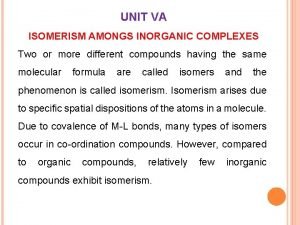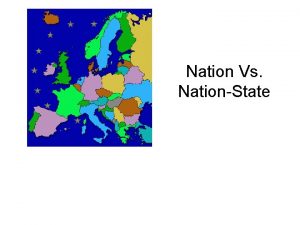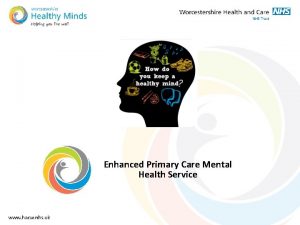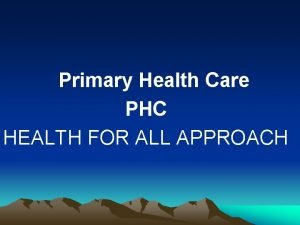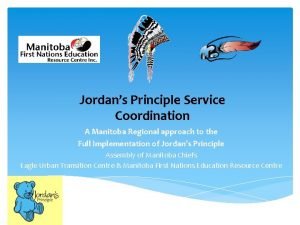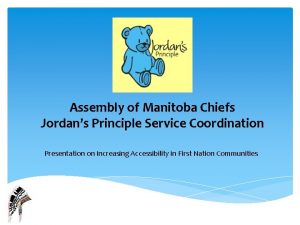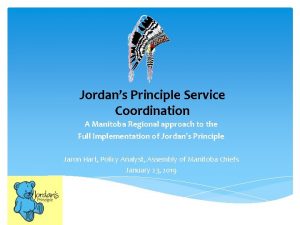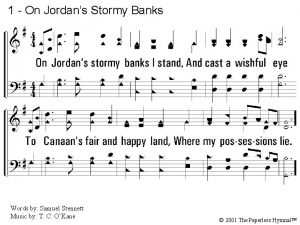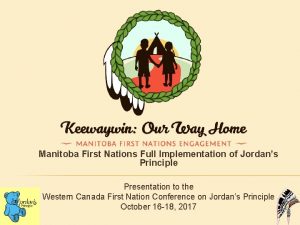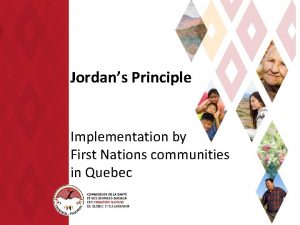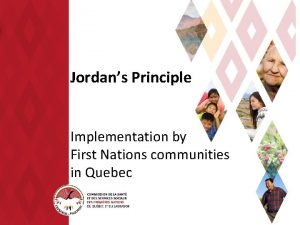Jordans Principle Enhanced Service Coordination First Nation Health








- Slides: 8

Jordan’s Principle Enhanced Service Coordination First Nation Health Consortium Alberta Region September 12, 2018

Our Children. . . Our Passion The First Nations Health Consortium Ltd. will provide: Jordan’s Principle, Enhanced Service Coordination; the link between the child & the needed program, service, supplies, equipment & support

Service Coordination Contact

Enhanced Service Coordination Key Goals Identify children with needs Facilitate early intervention Develop integrated care plans Connect the child and family to needed services Remove the stress of navigating service systems Support families as they manage their needs Involve Jordan’s Principle focal points, both provincially and federally, as necessary to expediently address immediate service gaps

The First Nation Health Consortium Consists of : Ø 4 Jordan’s Principle Access Worker’s are the first point of contact and provide intake services for the region. Ø 9 Regional Service Coordinators are situated throughout Alberta: *Calgary *Siksika *Cold Lake *Maskwacis *Edmonton * Kainai *Slave Lake *Grande Prairie *High Level Together the FNHC coordinators will navigate federal and provincial systems for First Nations children, youth and families to improve their access to education, social and health services.

Service Coordination Process CALLER CALLS TOLL FREE NUMBER JORDAN’S PRINCIPLE ACCESS WORKER GATHERS INFO, SCREENS & TRIAGES NEED FOR URGENCY Pathway #1 Pathway #2 General Enquiry Jordan’s Principle Access Worker refers caller to another service provider (community, provincial, federal) Provides information to resolve request Jordan’s Principle Access Worker documents call & resolution E n d RSC support for Family Facilitator Pathway #3 Pathway #4 Service Delay, Disruption or Denial Complex Case Management Jordan’s Principle Access Worker gathers information about family situation and Facilitator concerns and refers to a Regional Service Coordinator (“RSC”) Jordan’s Principle Access Worker documents call about delay, disruption or denial & refers to RSC Jordan’s Principle Access Worker documents call and refers to a RSC contacts the family and gathers additional information RSC conducts generalized screening & needs assessment (collaboration with family) RSC contact Family Facilitator and gathers information and determines action required RSC advises applicable service provider of Focal Point Application Case Conference? No Caller follow-up If service denial/delay/dis ruption, follow Pathway #3 RSC Admin follows up with caller (within 6 weeks or sooner) Yes More info needed No Provides information for service/support to address Family Facilitator concerns RSC Admin refers RSC Admin caseback to refers case to Jordan’s Principal Access Worker Principle Access Worker RSC Admin documents follow-up E n d RSC completes/submits Focal Point application RSC develops service plan Yes RSC organizes & documents case conference Focal Point reviews application Approved? RSC documents situation and resolution End RSC coordinates provision of service & supports Yes Focal Point advise family, child, RSC or other representative No RSC supports appeal process No Service Available ? Yes RSC follows Pathway #2: Focal Point Process & Appeal RSC monitors & follows-up with family/child E n d

Challenges & Lessons Learned Service Coordination Region/Focal Point National * Lack of Knowledge of Services Readily Available throughout the Region * Ever Changing Parameters of CHRT rulings * Group and Individual Requests creating confusion when First Nations utilize ‘Jordan’s Principle’ in their communication of service delivery for their project. The general public’s difficulty navigating through all the ‘Jordan’s Principle Navigators/Community Connectors increase. * Increasing/shifting in requirements pertaining to information and documentation * Communication approvals and denials is inconsistent. Limited staff increase, high case volume * Service provision and repayment is anywhere to 6 -12 weeks and longer. FNHC has proposed a process that would alleviate that process. * 12 – 48 hours clock starts once Focal Points receive all documentation they require. FNHC feels that the clock starts when the focal points are initiated/informed of the case * Increase in National oversight and decision making which slows down the process for approvals. Most Regional Service Coordinator’s cases are ‘pending’ * More supportive documentation is requested for Group Requests. * There are too many 1 -800 numbers pertaining to Jordan’s Principle which only adds more confusion to public when trying to navigate they system. FNHC feels that there should be only one number in Alberta.

FNHC Outreach


